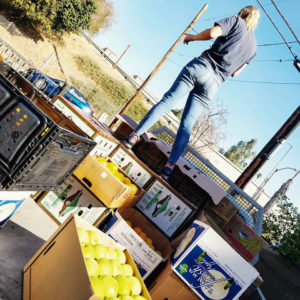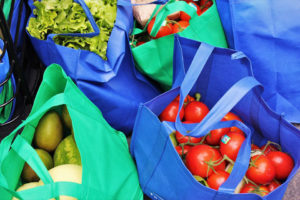
A Seeds of Hope staff member works on packing food for distribution. Photo: Seeds of Hope
As the Southland hunkers down to mitigate the spread of Coronavirus, Seeds of Hope, food justice ministry of the Episcopal Diocese of Los Angeles, is stepping up its efforts to ensure access to healthy, nutritious food by providing fresh fruits and vegetables to families struggling with food insecurity – especially during this crisis, which has made their circumstances even more dire.
While the ministry has had to make changes in the shape and scope of its work, Seeds of Hope continues to distribute fresh fruits and vegetables at sites across L.A. County. For all those who are stuck at home due to the Safer at Home initiative, the team is releasing video versions of the healthy-cooking and nutrition classes that it typically offers as hands-on instruction to address the prevalence of diet-related illness and obesity in Los Angeles.
Seeds of Hope was created by the diocese in 2013 as a response to the health crises in our communities related to poverty and food insecurity. The program grows and distributes food in over 100 communities of need across six Southern California counties while providing garden-based nutrition education. Its funders include the Los Angeles County Department of Public Health, the City of West Hollywood, the Kaiser Foundation, Wholesome Wave, as well as individual donors.
“For us, the equation has always remained the same,” says Tim Alderson, Seeds of Hope executive director. “Need plus capacity equals responsibility. There are tremendous needs in our communities right now and we have the capacity through our network of strategic partnerships with organizations like Food Forward to get food to people in need. As such, we see it as our responsibility to do so. This virus has only made our work more essential so we’re proud to be continuing to serve on the front lines of this crisis.”
With much of the city isolated in homes, grocery stores inundated with shoppers, and businesses closed to limit the spread of the COVID-19 virus, food insecurity has become an even more significant issue. In addition, the collection and distribution of food has also become more complex. Seeds of Hope is working to ensure that its team maintains recommended social distancing practices and is implementing regular disinfection to ensure that the staff remains healthy and that all equipment and produce are as clean as possible.
As an alternative to the in-person programming the organization offers, Seeds of Hope is publishing original and curated digital content that includes cooking, nutrition, and gardening videos, healthy recipes, as well as tips and resources for remaining healthy during this time. Additionally, the organization has adapted its fresh produce distribution efforts in response to the recommendations and guidelines of the CDC and local government. Seeds of Hope is arranging bulk drop-offs to correspond with volunteer bagging and distribution while also organizing mini distribution hubs where organizations can pick up produce for their own internal distribution.

Fresh, healthy produce is gathered to distribute to the needy by Seeds of Hope, food justice ministry of the Diocese of Los Angeles. Photo: Seeds of Hope
Seeds of Hope Nutrition Education Program Assistant Erica Nieves explains: “We knew that there was going to be tremendous need out there during this time because we see the need every day. Food insecurity is an issue we confront every day and with the changes in the food system and economy as a result of COVID-19, we knew that there would be even more families in need. We want to be able to continue getting fresh food out there and continue to teach people how to prepare it and stay healthy – even when stuck at home!”
A list of Seeds of Hope’s produce distribution sites can be found at its website. Video cooking instruction will be available on Facebook, YouTube, and the Seeds of Hope website.
Seeds of Hope encourages anyone interested in getting involved to volunteer to assist with bagging and distributing produce (while maintaining social distancing, of course). People can also help by donating protective gear like masks and gloves, helping to spread the word about these efforts, sharing social media resources, and, if able, supporting the work by making a contribution here.
